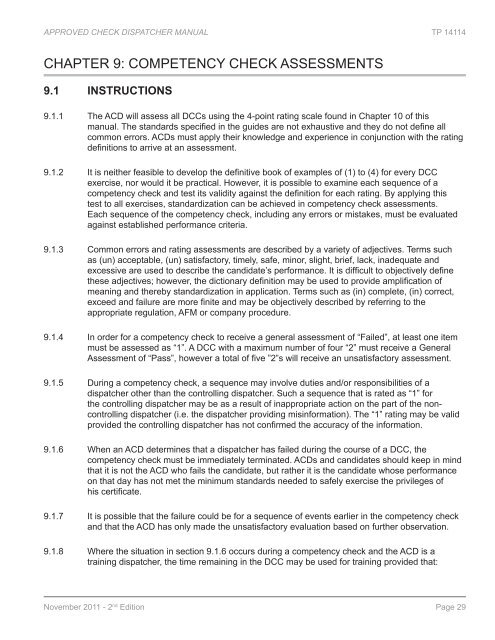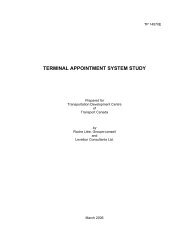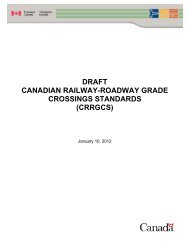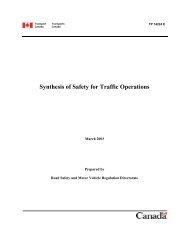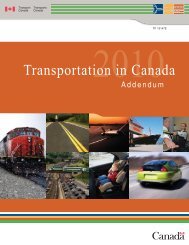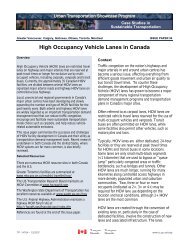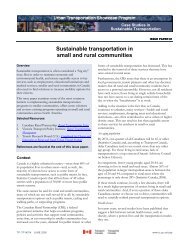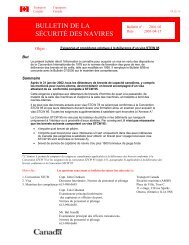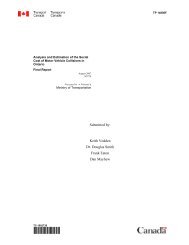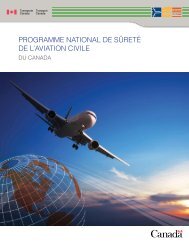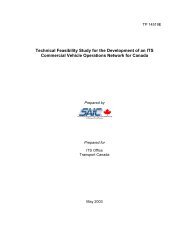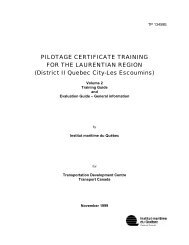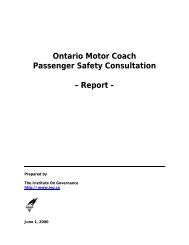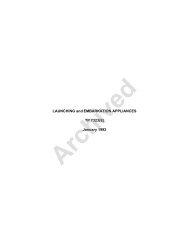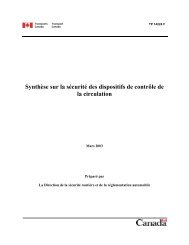APPROVED CHECK DISPATCHER MANUAL - Transport Canada
APPROVED CHECK DISPATCHER MANUAL - Transport Canada
APPROVED CHECK DISPATCHER MANUAL - Transport Canada
You also want an ePaper? Increase the reach of your titles
YUMPU automatically turns print PDFs into web optimized ePapers that Google loves.
<strong>APPROVED</strong> <strong>CHECK</strong> <strong>DISPATCHER</strong> <strong>MANUAL</strong> TP 14114<br />
CHAPTER 9: COMPETEnCY <strong>CHECK</strong> ASSESSMEnTS<br />
9.1 INSTRUCTIONS<br />
9.1.1 The ACd will assess all dCCs using the 4-point rating scale found in Chapter 10 of this<br />
manual. The standards specified in the guides are not exhaustive and they do not define all<br />
common errors. ACds must apply their knowledge and experience in conjunction with the rating<br />
definitions to arrive at an assessment.<br />
9.1.2 It is neither feasible to develop the definitive book of examples of (1) to (4) for every DCC<br />
exercise, nor would it be practical. However, it is possible to examine each sequence of a<br />
competency check and test its validity against the definition for each rating. By applying this<br />
test to all exercises, standardization can be achieved in competency check assessments.<br />
Each sequence of the competency check, including any errors or mistakes, must be evaluated<br />
against established performance criteria.<br />
9.1.3 Common errors and rating assessments are described by a variety of adjectives. Terms such<br />
as (un) acceptable, (un) satisfactory, timely, safe, minor, slight, brief, lack, inadequate and<br />
excessive are used to describe the candidate’s performance. It is difficult to objectively define<br />
these adjectives; however, the dictionary definition may be used to provide amplification of<br />
meaning and thereby standardization in application. Terms such as (in) complete, (in) correct,<br />
exceed and failure are more finite and may be objectively described by referring to the<br />
appropriate regulation, AFM or company procedure.<br />
9.1.4 In order for a competency check to receive a general assessment of “Failed”, at least one item<br />
must be assessed as “1”. A dCC with a maximum number of four “2” must receive a General<br />
Assessment of “Pass”, however a total of five ”2”s will receive an unsatisfactory assessment.<br />
9.1.5 during a competency check, a sequence may involve duties and/or responsibilities of a<br />
dispatcher other than the controlling dispatcher. Such a sequence that is rated as “1” for<br />
the controlling dispatcher may be as a result of inappropriate action on the part of the noncontrolling<br />
dispatcher (i.e. the dispatcher providing misinformation). The “1” rating may be valid<br />
provided the controlling dispatcher has not confirmed the accuracy of the information.<br />
9.1.6 When an ACd determines that a dispatcher has failed during the course of a dCC, the<br />
competency check must be immediately terminated. ACds and candidates should keep in mind<br />
that it is not the ACd who fails the candidate, but rather it is the candidate whose performance<br />
on that day has not met the minimum standards needed to safely exercise the privileges of<br />
his certificate.<br />
9.1.7 It is possible that the failure could be for a sequence of events earlier in the competency check<br />
and that the ACd has only made the unsatisfactory evaluation based on further observation.<br />
9.1.8 Where the situation in section 9.1.6 occurs during a competency check and the ACd is a<br />
training dispatcher, the time remaining in the dCC may be used for training provided that:<br />
november 2011 - 2 nd Edition Page 29


